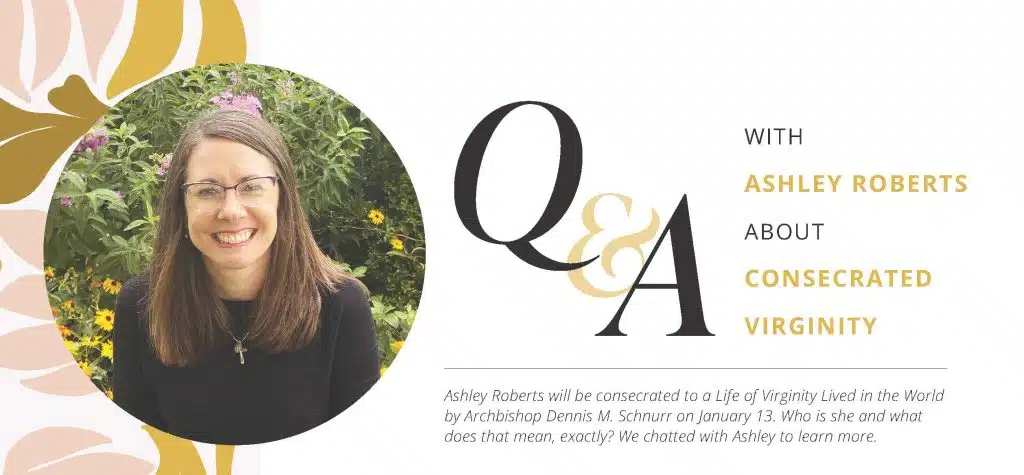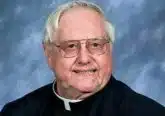Q & A with Ashley Roberts about Consecrated Virginity

Q: TELL US A LITTLE ABOUT YOU.
I grew up outside of Ashland, OH, but spent my adult life in this archdiocese’s northern area. My undergraduate degree is in music education, and I moved to this area when I was hired to teach band and choir. After a few years, I pursued a graduate degree in theology, and now I am the DRE in Logan County.
Q: WHAT IS YOUR VOCATION STORY?
As long as I can remember, I have been in love with Jesus. I did not necessarily recognize that as tending toward one vocation or another; it was just who I was, and how I always thought about Him.
I spent a long time without any feeling about a positive vocational direction. I wanted to get married and have children; I wanted to love Jesus; I was sometimes afraid I was supposed to be a nun, but didn’t feel like I was actually called to that. My first exposure to consecrated virginity came about during a time when I worried that I had missed what I was supposed to be doing. I read some things online and thought the vocation sounded a lot like me.
Things started to pick up after a difficult period in my life. It was suggested that I search for scripture passages that might give the Lord the opportunity to explain what He was doing. After praying with the passages for a few months, I felt the Lord ask if I would let … His children be my children. As time went by, there was increasing clarity in my heart that I was not called to marriage. I started to wonder about consecrated virginity because I remembered how naturally it seemed to match my personality.
I was a little apprehensive about actually entering any official discernment, because my whole heart was on the line. There was a great deal of emotional risk involved, even when the conversation was just between God and me. I was certain that, given the opportunity, I would love to marry Him; but I wasn’t sure if He wanted to marry me. I also asked Him for a gentle nudge, because I was awfully nervous. He sent the nudge, and here I am!
Q: WHAT IS A CONSECRATED VIRGIN?
It might help if we consider the words “consecrated” and “virgin” in their turn.
A consecrated virgin is a woman who offers her virginity to Christ permanently. Like the reception of holy orders is reserved for men, receiving the consecration is reserved for women. It is a lifelong commitment—in fact, the grace of the consecration changes the soul such that a woman can only receive the consecration once. A consecrated virgin never belonged to another in the past, and will never belong to another in the future. To be consecrated means to be set apart exclusively for the divine. The consecration itself is not about a vow that a virgin makes—rather, the emphasis is on God’s action, performed at the hands of the bishop. God sets the virgin apart to be an image of the Church, especially the Church as the Bride of Christ. You might say that the grace of consecration—which is not a sacrament, but is a very powerful sacramental— gives, in a way, the virgin the ability to be what the Church is and do what the Church does. Jesus meant for His Church to be virgin, bride and mother. As virgin, the Church maintains the integrity of the entirety of the faith in purity and wholeness; as bride, the Church loves, welcomes and yearns for Christ with devotion; as mother, the Church gives and sustains life in believers’ souls. The consecrated virgin really participates in the Church’s bridehood in these ways.
This vocation has been around as long as the Church and, in fact, finds its institution in the Annunciation. Of course, Our Lady, Virgin of Virgins, is the exemplar. Historically, the consecration of virgins living in the world fell into disuse and was even prohibited for a time; but after Vatican II, the rite was revised and again made available. There are about 300 consecrated virgins in our country, and I will be the second for the Archdiocese of Cincinnati.
Q: WHAT WILL HAPPEN AT YOUR CONSECRATION?
A parable and a wedding! I will wear a wedding dress, and during the rite of consecration, I will be given a veil and a ring. My ring will have the 12 stones that Revelation 21 mentions adorn the New Jerusalem. I also have a lamp to be lit during the rite that I will carry at certain points, like the wise virgins in the parable.
Q: ONCE YOU’RE CONSECRATED, WHAT NEXT?
On one hand, I don’t know! This question has been on my mind a lot. My impression is that the consecration is a grace that has to be “grown into.” The documents of the Church and the Fathers, saints, scholars and virgins speak about a closer intimacy with Christ, greater apostolic effectiveness, deeper union with the Mass, all sorts of things which are exciting and frightening in all the right ways. I have high hopes and many desires.
On the more objective level, I am to pray the liturgy of the hours, be committed to prayer and the service of my brothers and sisters and remain faithful to my marriage with Christ.
Q: What does that designation imply? Are you with an order? Do you have a specific charism?
The easiest explanation is no–I’m not with an order, and so there is no specific charism. My vocation isn’t a part of religious life in that sense. Rather, it is lived within the circumstances of an ordinary life in the world, and on a fairly individual basis. I will not live in community, wear a habit, have a title (like “sister”), change my name, or take vows. Since I am not part of a religious family, there is no particular apostolate to which I am committing. Consecrated virgins have a special connection to their bishop, and so to their diocese. I think a good example to mention is St. Cecilia (who also happens to be my confirmation saint): since she lived in Rome, her bishop was the pope, and they knew each other and had a relationship (he came when she was dying). But I think what is even more special is that, after her martyrdom, the popes would come and hide at her house during times of persecution. I think that is a beautiful expression of the enduring relationship she had with her diocese, and also a particularly beautiful expression of her vocation of being an image of the Church; even after her death, you knew you could be “home” with her.
Now, I said that was the “easiest” explanation; however I am actually entering the Order of Virgins, and there is a charism–that of virginity. Charism, in this sense, should be interpreted along the lines of a grace given by God, the use of which comes with a certain ease and attractiveness, for the purpose of encouraging others to holiness, and so on. They say that if you have the charism of virginity, it was given to you at your baptism by the Father, and He has defended and protected it throughout your life so that nothing would interfere with you eventually receiving the consecration. This was one of the things that helped me discern, actually–when I heard that, my heart lit up. It is hard to express how it both humbles and touches me. And, in fact, I am receiving the consecration on the anniversary of my baptism, and am so very happy to be able to return this great gift to the Father.
Q: Do you have any special devotions?
I am pretty attached to Mass, holy hours, the rosary, and the chaplet of Divine Mercy. My closest saints are Sts. Cecilia, Therese, Mary Magdalene, Anthony of Padua, Bartholomew, Thomas Aquinas, and JPII. And certainly, for any problem involving cars, tools, appliances, plumbing, electricity, jars that won’t open, heavy items, bugs, etc… St. Joseph, Father and Guardian of Virgins. I invoke him under that title fairly frequently.
Q: What are you looking forward to most in this new vocation?
There is a recent Vatican Instruction on the Order of Virgins called Ecclesiae Sponsae Imago. Paragraphs 23, 24, and 25 are very rich, and I would love to cite them at length here, but I will include just a few sentences from paragraph 23: ” The charism of virginity, accepted by the woman and confirmed by the Church through consecration, is a gift that derives from the Father, by means of the Son, in the Spirit. This gift safeguards, purifies, heals and increases the capacity of the person to love. It draws back into unity every fragment of her history and the various dimensions of her humanity – spirit, soul and body –, so that she might be able to respond to this grace with the undivided, free and joyful commitment of her own existence.”
That is the serious answer. Equally true, but less serious, is that I can’t wait to mess with people in the sorts of conversations you have when you meet them on airplanes, etc. I am building a mental repertoire of responses to questions like, “Are you married? What is your husband’s name? What does he do for a living? Is he at home today, or…? How many children do you have?” I am open to suggestions.
Q: HOW CAN THE FAITHFUL PRAY FOR YOU?
I so very much want to live this vocation well for Our Lord. Prayers for that would mean so much!
This article appeared in the January 2024 edition of The Catholic Telegraph Magazine. For your complimentary subscription, click here.













